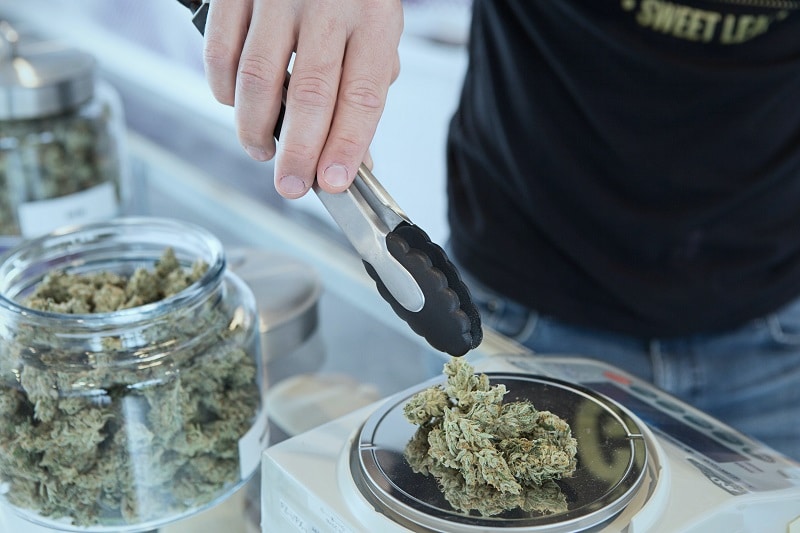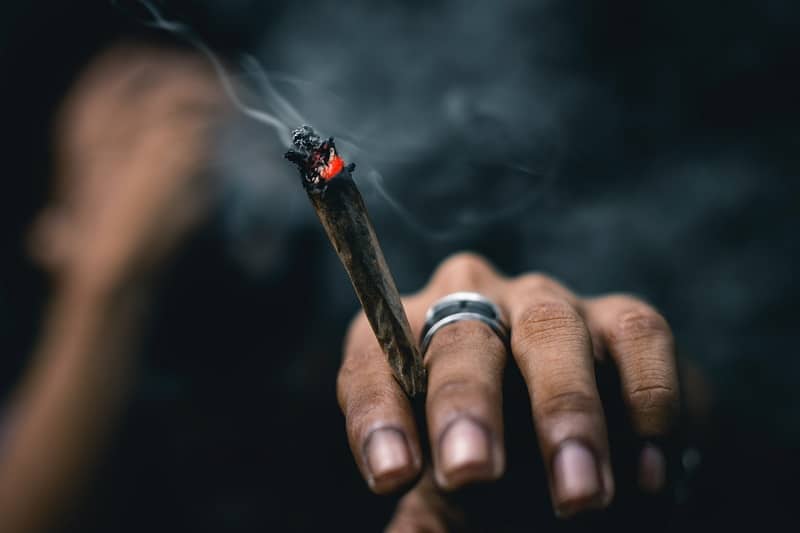
Five miles separate the downtowns of Manitou Springs and Colorado Springs. In Manitou, it’s a short walk from City Hall to the nearest hiking trail. In the bigger city, bicycle lanes dominate roads. The two cities share Colorado Avenue, a major thoroughfare connecting the downtowns. Drive west along Colorado Avenue and discover numerous medical marijuana dispensaries until you reach Manitou with its two retail/medical marijuana dispensaries.
A quick Internet search reveals enormous price differences between dispensaries in Manitou and Colorado Springs. At Living Rose dispensary in Colorado Springs, medical marijuana flower sells for $100/ounce and is taxed at a 2.9% rate. Maggie’s Farm, a short drive down the avenue and in Manitou Springs sells retail marijuana flowers for $200/ounce and is taxed at a rate of 30%. Colorado Springs allows only medical marijuana dispensaries to serve a small market of state-approved medical patients. Manitou’s two retail marijuana dispensaries serve a much broader consumer base and are open to the adult public.
Tax Rate: Medical marijuana is subject to the 2.9 percent state sales tax, which is applied to most purchases of tangible personal property in the state while retail marijuana is exempt. Retail marijuana is subject to a 15 percent sales tax, levied on retail sales, and a 15 percent excise tax, levied on the first transfer of marijuana from a wholesaler to a processor or retailer.
This November, voters will have the opportunity to allow existing Colorado Springs medical dispensaries to also sell retail marijuana with Questions 300 and 301. A related ballot issue will ask voters if they approve a 5% tax to be included if retail marijuana is approved.
Voters shouldn’t have to pay additional taxes to have access to retail marijuana. The eradication of the marijuana black market was a selling point during the passage of Amendment 64 but still, the black market remains; further legalization likely won’t change that. Voters seeking to legalize retail marijuana should realize excessive regulations and taxes imposed on a struggling marijuana industry may undo their votes and hopes.
Struggling Retail Marijuana Industry
The marijuana industry in Colorado is micromanaged by a hodgepodge of state and local regulations. From advertising to product packaging to limits on concentrates, marijuana businesses have been subjected to some of the strictest regulations faced by any industry.
The federal ban on marijuana remains part of the problem. This has created obstacles for marijuana businesses to exist. Difficulties with banking, federal tax codes, and unfair targeting by governments for taxation exploitation have contributed to a struggling industry.
Other issues facing the marijuana industry include inflation, economic downtowns, and of course, constant demonization of legit consumers and businesses, all of which make running a marijuana business a risky enterprise. Retail marijuana legalization in Colorado Springs may temporarily help some dispensaries move towards profitability but federal rules will continue to complicate matters.
Taxes? We Don’t Need More Stinkin’ Taxes!
Proponents of retail marijuana legalization claim Colorado Springs is losing an estimated $10-15 million in retail marijuana sales tax revenue each year. In years past, politicians in Manitou Springs boasted of marijuana sales tax revenue windfalls, along with a pronounced ability to fund some government programs.
The extreme price differences in marijuana sales also reflect the different marijuana sales taxes for each city. Since medical marijuana dispensaries serve a state-approved market, taxes are kept low. Retail marijuana sales taxes are high compared to medical marijuana. It’s clear to see the impact of high taxes on the prices of retail marijuana. The black market, meanwhile, requires no taxes and may offer people an alternative to legal dispensaries with their expensive, heavily taxed products.
If voters approve retail marijuana, a related ballot question will ask if they want to add a 5% tax. An additional tax to fund assistance programs for veterans sounds noble and wonderful but this is a call to action to raise prices. As prices rise, consumers may purchase fewer items; when sales drop, beneficiaries of the tax will lose funding.
Voters should reject the 5% tax.

What About the Marijuana Black Market?
One of the goals of legalizing retail marijuana is to end the black market. The problem is not small businesses selling marijuana to consumers that made the black market thrive. The problem is legalization itself: It created too many rules, and regulations, and allowed too many government entities to impose their own taxes on top of the state’s already-high taxes.
For many people, going to a friend or a local dealer or supplier is much more convenient and affordable than going to a state-approved dispensary. Additionally, excessive regulations tend to encourage people to eschew legal routes to owning a marijuana business, perhaps enabling black market marijuana businesses to engage in morally outrageous practices, such as engaging in human trafficking as part of their operations.
Tax Exemption: Medical marijuana is exempt from the 15 percent sales tax and 15 percent excise tax.
Legalizing retail marijuana will help reduce the black market and associated violence. But it is naïve to believe legalizing retail marijuana will end the black market. It’s not going anywhere so long as there’s any kind of federal marijuana ban. Many people will get their marijuana regardless of legal frameworks or taxes or safety regulations; the marijuana black market will remain a viable option for them.
Voters should see through the smoke and recognize the pitfalls of legalizing retail marijuana: It may become even more heavily regulated with far more taxes, thereby enabling the black market to flourish. The best thing voters can do is a vote to legalize retail marijuana and vote NO on the related tax.










[…] the market to gain even more marijuana businesses. According to an article published by Westword, Colorado Springs and unincorporated Jefferson County rejected adding retail marijuana sales, but there were measures […]